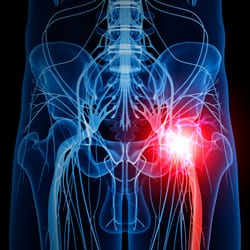Hip Pain: Easing Discomfort with Proven Solutions
It May Not Be Your Hip
True hip pain culprits include impingement, labral tear, bursitis, pain coming from the gluteal tendon, and osteoarthritis.
Leading orthopaedic and sports medicine treatments
Learn about Emory Orthopaedics & Spine care. Make an appointment online, find a provider or call 404-778-3350 to schedule an appointment.
“One of the major things we immediately try to differentiate between is if it’s actually a hip condition—or is the pain coming from the back?”
Causes & Symptoms of a Hip Condition
Sometimes the shape of the bones leads to impingement—the socket and ball essentially running into each other and tearing cartilage around the rim. A fall can sprain the hip and tear tendons.
“Most people think their hip is on the back and on the side, what we would call the flank,” states Dr. Whitfield. “It turns out, conditions within the ball and socket are usually felt in the groin, more on the front than the back.” Typically, patients experience discomfort going from a seated position to a standing one. Pain can be triggered by certain activities or accompany every step.
Getting a Diagnosis
If there’s nothing else going on with the body, most normal aches and pains should go away within two weeks. If pain is holding on after two to six weeks, it’s time to get it checked out.
“When diagnosing hip issues, we really take into account an entire view: history, physical, imaging, and response to treatment,” explains Dr. Whitfield. “That helps us determine where exactly the pain is coming from and what condition is most relevant.”
Treatment Options
Some patients just want to be reassured nothing major is to blame and will often do nothing more if the pain is not limiting. However, Dr. Whitfield finds injections in the symptomatic location to be quite helpful.
“The other approach I routinely take is physical therapy. Much of the pain individuals experience is from muscle imbalances,” states Dr. Whitfield. “Physical therapy can help to correct that.”
Anti-inflammatory medications and avoiding activities that exacerbate the pain are also options. If significant pain continues over a long period of time, surgery should be considered.
Hip Surgery
When a patient has arthritis, the only reliable answer is to remove the damaged cartilage in the underlying bone and replace it with different material such as metal and plastic, which is hip replacement.
Pain may also be a result of a tear in the labrum from a sprain or bones impinging, or because of a torn tendon. “If there’s no significant arthritis in the hip, I can go in and remove some of the bone that is impinging and repair the labrum,” explains Dr. Whitfield. “Oftentimes, that’s very effective in taking away the pain.”
Benefits of Total Hip Replacement
In terms of risk versus reward, total hip replacement is considered one of the most successful surgeries and is effective in easing the majority of osteoarthritis pain.
“As techniques have advanced, we’ve changed our approach. A direct anterior procedure is minimally invasive and does not require any muscle detachment,” states Dr. Whitfield. “This allows for a quicker recovery.”
How Long Does a New Hip Last?
“I tell people it’s like a car,” says Dr. Whitfield. “If you’re just driving slowly on Sundays, the tires will never wear out. However, if it’s a sports car and you’re going off the line and around corners quickly, those tires are probably not going to last the life of the car. In my opinion, if a new hip doesn’t last a good 15 to 20 years, I’m disappointed. My hope is that it can last up to 30 years or more.”
For more information about hip pain and treatment, please visit emoryhealthcare.org.
About Bryan Whitfield, MD
Dr. Bryan Whitfield has extensive training and experience in treating all individuals who want to maximize their potential to be active, from high-performing athletes to individuals who simply want their joints to keep up with their lifestyle. He believes in a patient-centered approach, tailoring his treatments both operatively and non-operatively to the individual patient’s needs. He earned his BS from Duke University in mathematics and economics before obtaining his medical degree from the George Washington School of Medicine and Health Sciences.
Leading orthopaedic and sports medicine treatments
About Emory Orthopaedics & Spine Center
Emory Orthopaedics & Spine offers comprehensive orthopedic and spine care at multiple locations across the Atlanta metro area, and our orthopedic and spine programs are ranked among the top in the nation. Our highly trained orthopaedic and spine specialists work together to diagnose and treat a wide variety of orthopaedic, spine, and sports medicine conditions.
Our physicians use innovative approaches to care – many of them pioneered right here at Emory – to ease your pain and get you back to an active lifestyle.
Emory University Orthopaedics & Spine also has among the highest patient satisfaction and best outcome rates in the nation* for your surgery. By using advanced research techniques developed by our top surgeons, we can make sure your surgery is done right the first time.
*Results based on an average of 86% patient satisfaction rating compared to a national benchmark of similar facilities at 68%. Infection rates averages at .45% for primary hip and knee procedures compared to .58% nationally.
Related Posts
-
 Hip replacement can help you get back to enjoying life. Emory Healthcare explains what to expect with hip replacement surgery and if you’re a candidate.
Hip replacement can help you get back to enjoying life. Emory Healthcare explains what to expect with hip replacement surgery and if you’re a candidate. -
 You may have heard of hip replacement, but do you know what hip preservation is? Learn how Emory Healthcare supports patients in keeping their natural hip longer.
You may have heard of hip replacement, but do you know what hip preservation is? Learn how Emory Healthcare supports patients in keeping their natural hip longer. -
 For people of all ages, regular exercise is one of the best ways to stay healthy. It can slow the aging process, lengthen your life and improve brain health.
For people of all ages, regular exercise is one of the best ways to stay healthy. It can slow the aging process, lengthen your life and improve brain health.
Recent Posts
-
Nov 17, 2025
-
Nov 10, 2025
-
Nov 4, 2025
-
Oct 31, 2025
-
Oct 30, 2025
-
Oct 10, 2025


